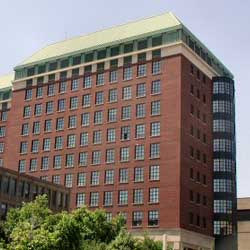Medical Students
 The Department of Neurology at University Hospitals provides a variety of educational programs for students in the School of Medicine of Case Western Reserve University.
The Department of Neurology at University Hospitals provides a variety of educational programs for students in the School of Medicine of Case Western Reserve University.
Visiting students from other schools may also participate in these rotations in the fourth year.
- NEUM 4000A: Neurology Acting Internship (University Hospitals)
- NEUM 4001A: Neurologic Critical Care (University Hospitals)
- NEUM 4002A: Neurology Adult Stroke Acting Internship (University Hospitals)
- NEUM 4003A: Neurology Adult Epilepsy (University Hospitals)
How to Apply
Visiting medical students wishing to take an elective can apply through the AAMC-VSLO platform.
The sole exception is with our major affiliate, Case Western Reserve University. CWRU SOM students should continue to register through the Case SOM Registrar’s Office.
Learn More about our application process and timelines at the UH Medical Student Office.
We ask that non-CWRU visiting students DO NOT contact departments directly. If you have any questions, please fill out the Undergraduate Medical Office's online contact form.
Third Year Core Clerkship
All medical students are required to complete the third year Block III Core Clerkship which includes neuroscience and psychiatry. The foundation of neurologic diagnosis rests on the knowledge of neuroanatomy in conjunction with the neurologic history and physical examination. More than any field, neuroscience relies upon the oldest principles of medicine and the latest in modern technology.
With this knowledge base, advanced imaging techniques, immunologic studies and molecular genetics can then be applied to define the underlying disorder. Rapidly evolving advances now allow for treatments and surgical techniques of various neurologic disorders that were not possible a few years ago.
Clinical Experience across Neurological Disease Processes
The neuroscience portion of the Block III core clerkship allows students direct hands-on experience with a variety of neurologic patients and disease processes. All students will have responsibilities for inpatient care under the supervision of either neurology and/or neurosurgery house officers and attendings. In addition, students will attend weekly outpatient clinics. Each student will be assigned to rotate through University Hospitals Cleveland Medical Center's general neurology, stroke neurology, neurocritical care, pediatric neurology or neurosurgery services or the Louis Stokes Cleveland VA Medical Center's neurology service.
Each Friday, all students convene for didactic sessions covering core topics, including clinical aspects of neurology and neurosurgery.
Please keep in mind, it is not possible to master the entire field of neuroscience during a several year residency, let alone a month clerkship. However, with diligent study, motivation and initiative, each student will be able to become proficient in the evaluation of neurologic patients and learn the core concepts of neuroscience every physician needs to know, regardless of the field of medicine or surgery he/she ultimately practices.


